Module 8 Story time Unit 2 Goldilocks hurried out of the house (7) 课件(共41张PPT)
文档属性
| 名称 | Module 8 Story time Unit 2 Goldilocks hurried out of the house (7) 课件(共41张PPT) |  | |
| 格式 | ppt | ||
| 文件大小 | 1.7MB | ||
| 资源类型 | 教案 | ||
| 版本资源 | 外研版 | ||
| 科目 | 英语 | ||
| 更新时间 | 2022-05-07 20:22:02 | ||
图片预览

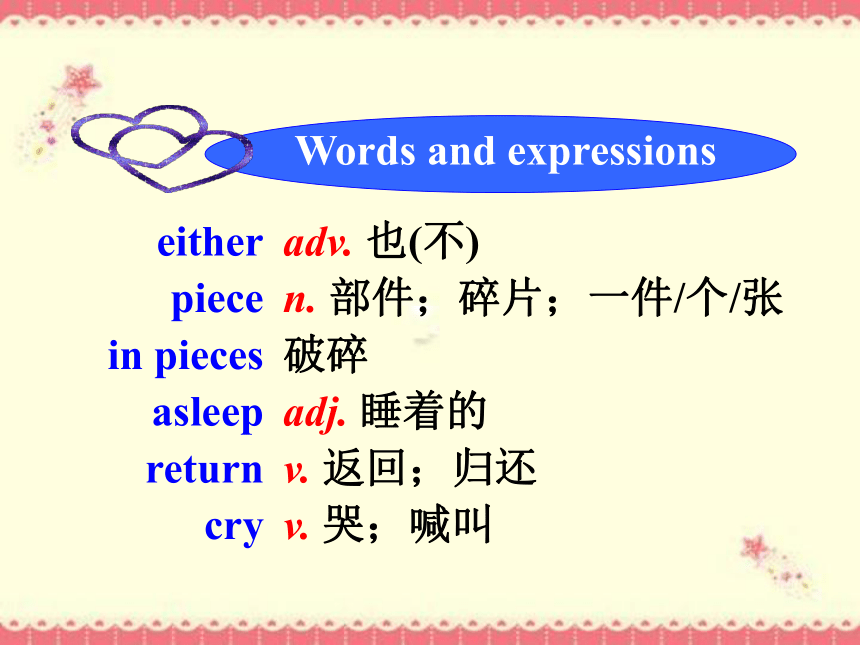
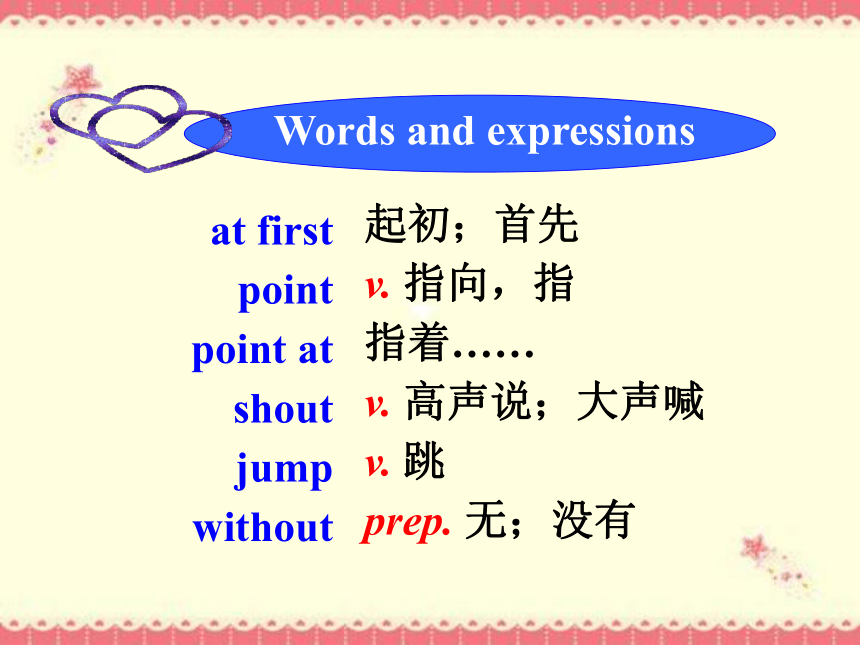
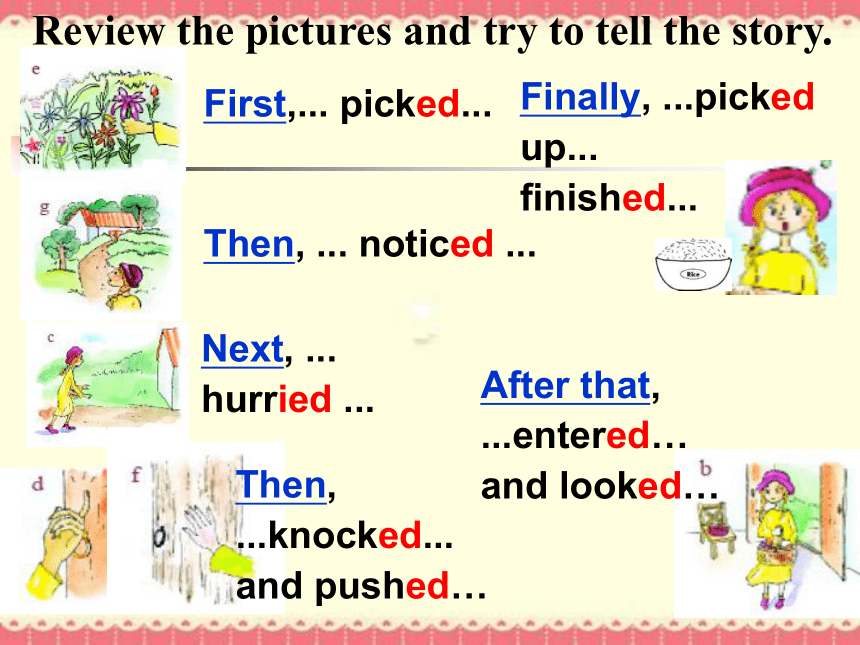
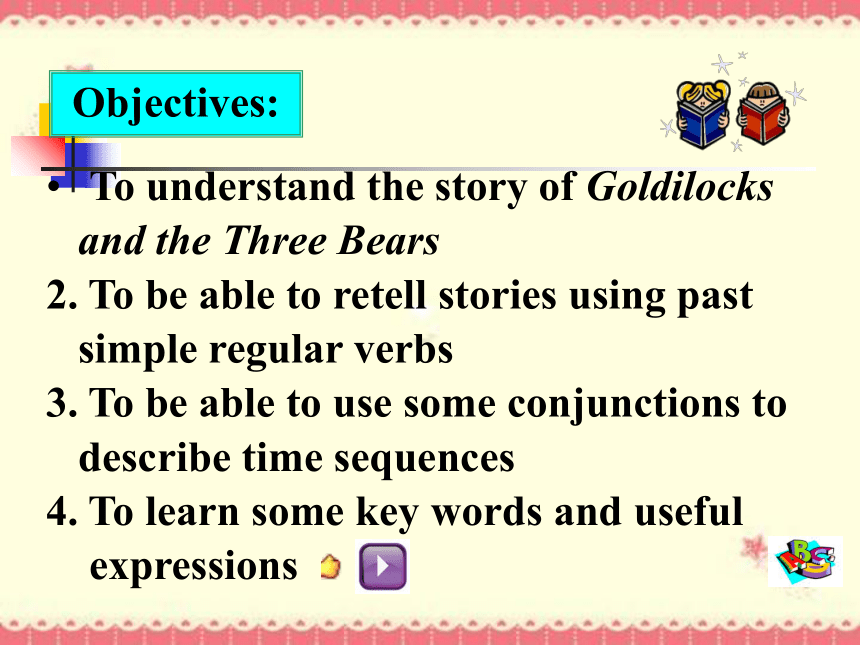
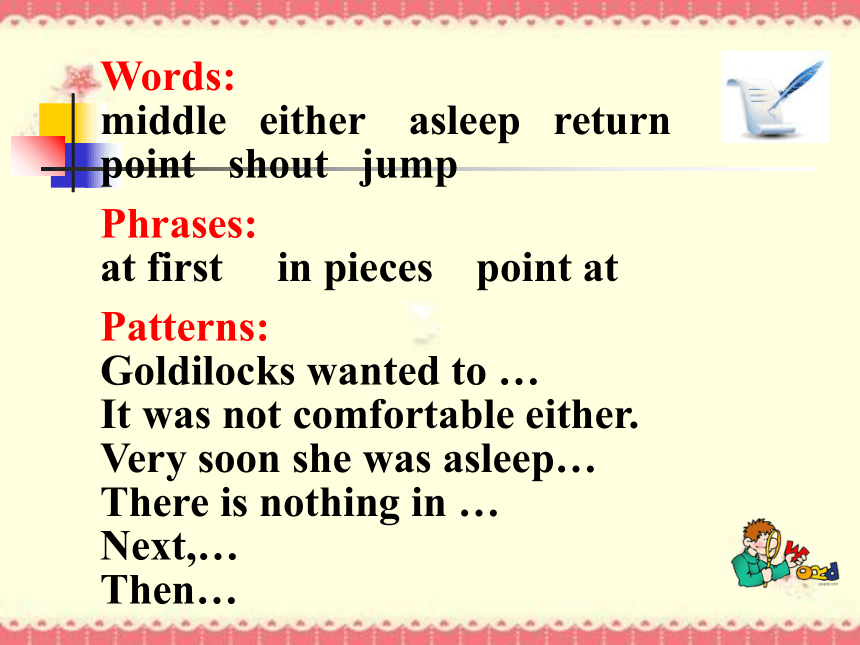
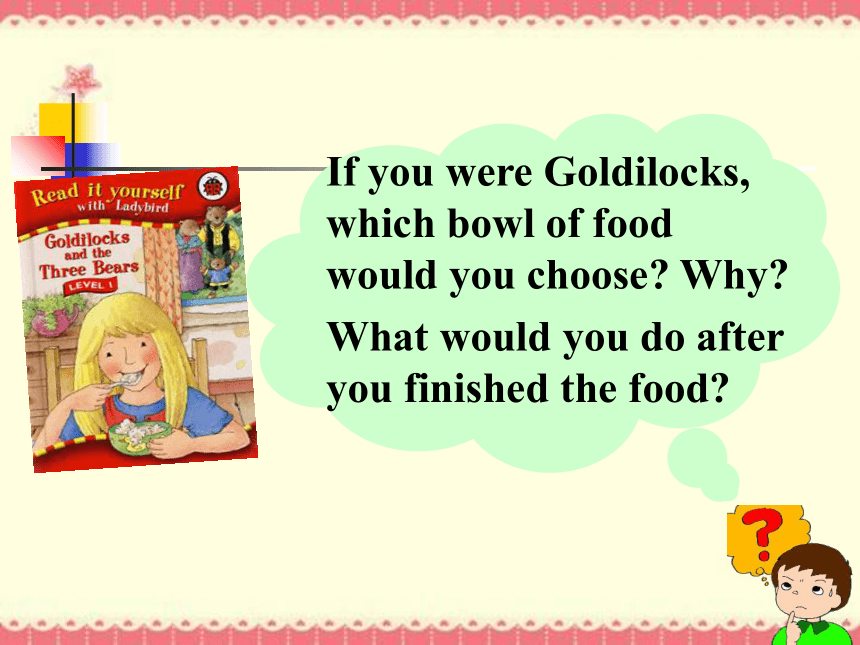
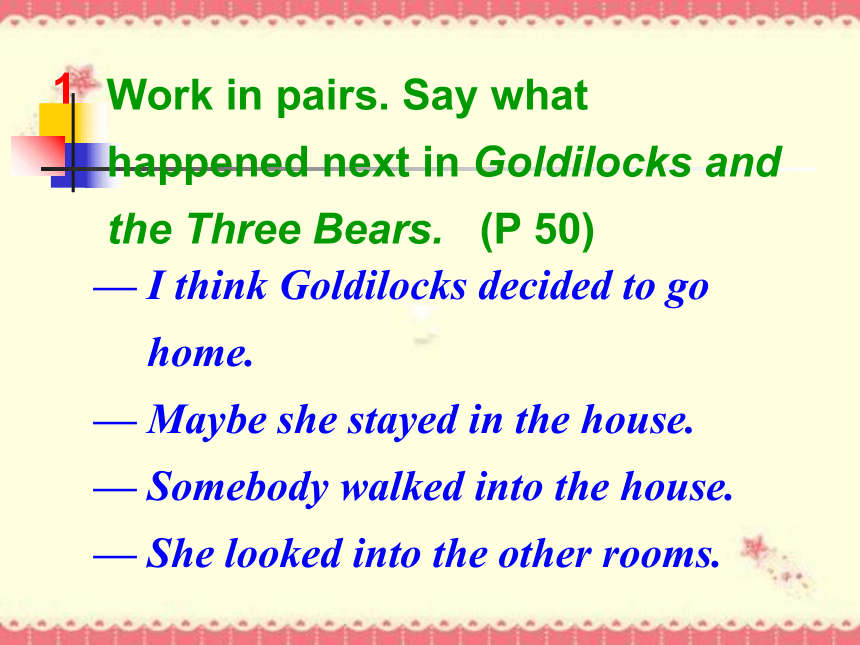
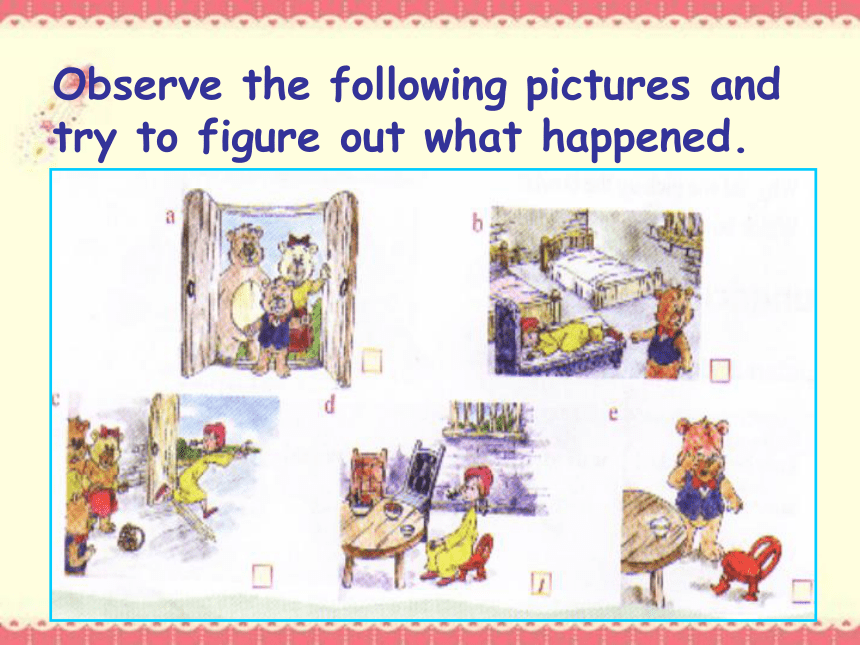
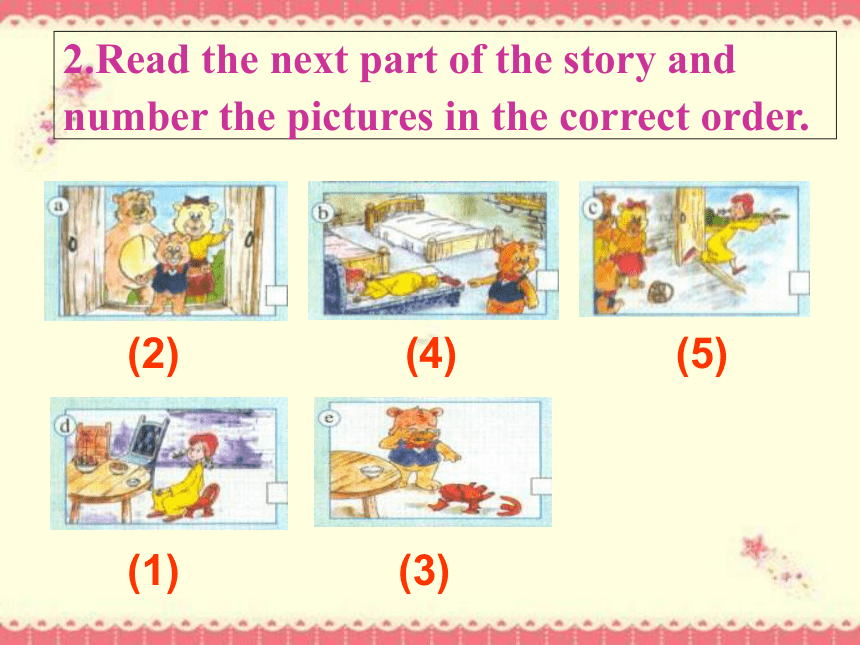
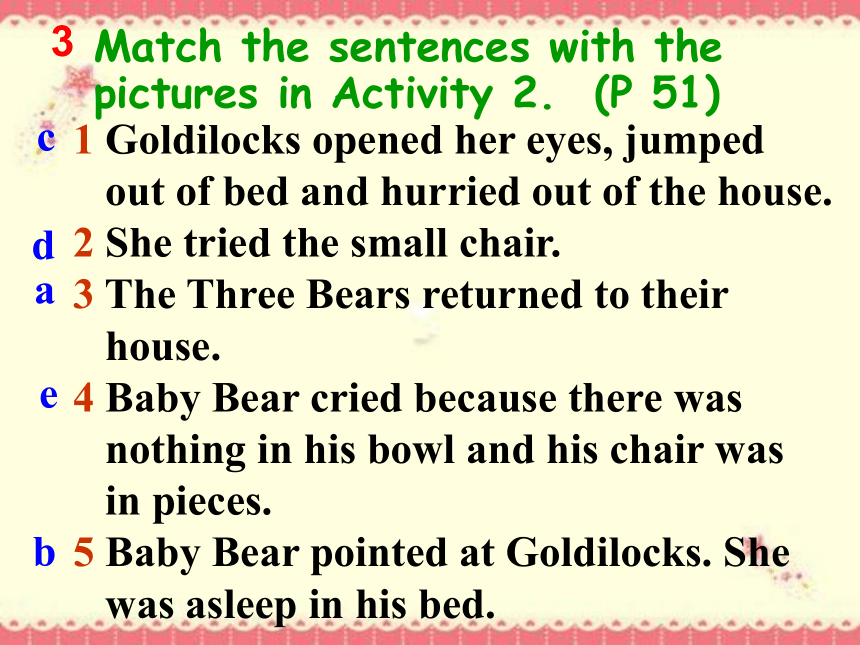
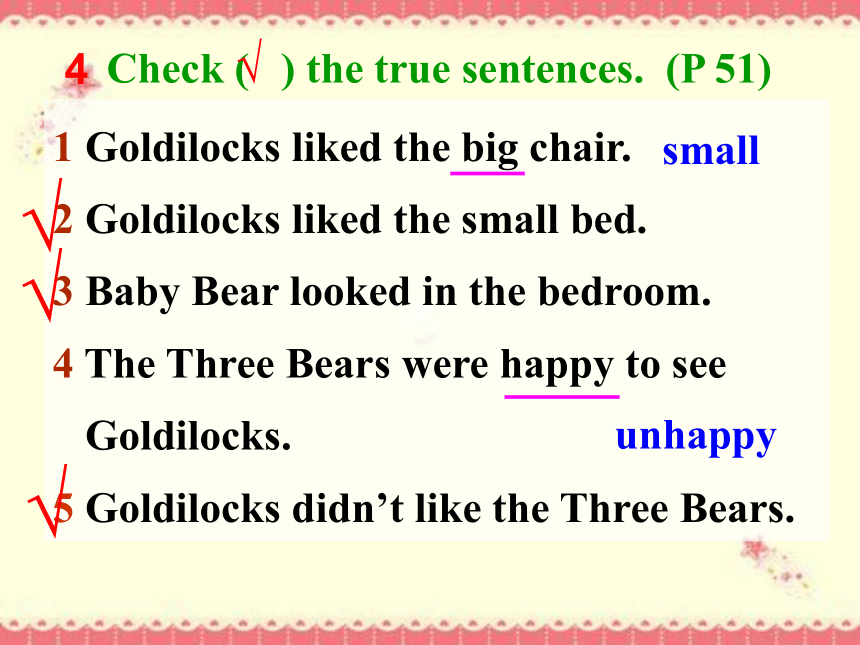
文档简介
(共41张PPT)
Unit 2
Goldilocks hurried out of the house.
Module 8
Story time
either
piece
in pieces
asleep
return
cry
adv. 也(不)
n. 部件;碎片;一件/个/张
破碎
adj. 睡着的
v. 返回;归还
v. 哭;喊叫
Words and expressions
at first
point
point at
shout
jump
without
起初;首先
v. 指向,指
指着……
v. 高声说;大声喊
v. 跳
prep. 无;没有
Words and expressions
Review the pictures and try to tell the story.
Finally, ...picked up...
finished...
First,... picked...
Then, ... noticed ...
Next, ... hurried ...
Then,
...knocked...
and pushed…
After that,
...entered…
and looked…
To understand the story of Goldilocks and the Three Bears
2. To be able to retell stories using past simple regular verbs
3. To be able to use some conjunctions to describe time sequences
4. To learn some key words and useful
expressions
Objectives:
Words:
middle either asleep return point shout jump
Phrases:
at first in pieces point at
Patterns:
Goldilocks wanted to …
It was not comfortable either.
Very soon she was asleep…
There is nothing in …
Next,…
Then…
If you were Goldilocks, which bowl of food would you choose Why
What would you do after you finished the food
— I think Goldilocks decided to go
home.
— Maybe she stayed in the house.
— Somebody walked into the house.
— She looked into the other rooms.
Work in pairs. Say what happened next in Goldilocks and the Three Bears. (P 50)
1
Observe the following pictures and try to figure out what happened.
2.Read the next part of the story and number the pictures in the correct order.
(2)
(4)
(5)
(1)
(3)
1 Goldilocks opened her eyes, jumped
out of bed and hurried out of the house.
2 She tried the small chair.
3 The Three Bears returned to their
house.
4 Baby Bear cried because there was
nothing in his bowl and his chair was
in pieces.
5 Baby Bear pointed at Goldilocks. She
was asleep in his bed.
b
a
e
c
d
Match the sentences with the pictures in Activity 2. (P 51)
3
1 Goldilocks liked the big chair.
2 Goldilocks liked the small bed.
3 Baby Bear looked in the bedroom.
4 The Three Bears were happy to see
Goldilocks.
5 Goldilocks didn’t like the Three Bears.
√
4
Check ( ) the true sentences. (P 51)
√
√
√
small
unhappy
Task 1: Read Para. 1 and answer the questions.
Why did Goldilocks want to sit down
Which chair did she like
But then what happened to the chair
Because she was tired.
She liked the small chair.
The chair was destroyed. It was in pieces.
Task 2: Read Para. 2 and check the true sentences.
Goldilocks liked the small bed.
She was asleep in the chair very soon.
√
×
bed
Task 3: Read Para. 3 and answer the question.
Why did Baby Bear cry
Because there’s nothing in his bowl and his chair was in pieces.
Task 4: Read Para. 4 and check the true sentences.
The Bears noticed Goldilocks at first.
The Baby Bear cried again because the little girl was in his bed.
√
×
didn’t notice
Task 5: Read Para. 5 and answer the question.
1. Was she very tired How do you know
2. What did Goldilocks do when she noticed the three Bears
3. Did she return to the forest again
She jumped out of bed and hurried out of the house without her basket.
No, she didn’t.
Yes. Because soon she was asleep in bed.
Language points
1. It was not comfortable either.
它也不舒服。
— I can’t swim. 我不会游泳。
— I can’t swim, either. 我也不会游泳。
试比较:
— I can swim. 我会游泳。
— I can swim, too. 我也会游泳。
either 的意思是“也(不)”,常用于否定句。例如:
also是比较正式的用语,经常放在句中,其位置在行为动词之前,be动词、助动词或情态动词之后。
注意与too, also的区别:
too一般用在肯定句中,放在句末。
例如:
Linda wants to go to the piano lesson, too.
My brother also works in that factory.
2. Very soon she was asleep in it.
她很快就在床上睡着了。
asleep是形容词表示“睡着了”,强调状态,常用短语:be asleep ; fall asleep .
go to bed/sleep 是动词短语,“去睡觉”,只是强调“去睡觉”的行为,但不一定“睡着了”。
每天晚上你几点睡觉啊?
What time do you go to bed every night
孩子们在车上睡着了。
The children were asleep in the car.
Practise
3. The Three Bears returned.
三只熊回来了。
return“返回(某处)”,是不及物动词,后加to才可跟地点名词,return to相当于“go back to / get back to / come back to”,因此 return后不可再跟back。
return 还可表示“归还”的意思。
改正句子。
1. We will return Sanya tomorrow.
2.Mr Black asked his son to return back the books to the library. ________
Practise
去掉back
地名前加to
4. Then Baby Bear pointed at the little girl in his bed and shouted…
小熊指着他床上的小女孩喊了起来……
He pointed at the boy. 他指着这个男孩。
He pointed to the south. 他指着南方。
point at 表示“指着某人或某物”;
point to 表示“指向……”。如:
5. Goldilocks jumped out of bed and hurried out of the house without her basket.
金凤花姑娘从床上跳下来,也顾不上提篮子便冲出了房间。
without作介词,意为“无、没有”,后可接名词、代词或动词的-ing形式作宾语。如:Mark went out without having breakfast.
那个小男孩没有敲门就进入了房间。
The little boy entered the room without knocking on the door.
Practise
Goldilocks tried the three chairs and liked the small chair, but she was very heavy and soon the small chair was in (1)_______. She walked into the bedroom. She tried the middle bed, but it wasn’t comfortable and the big bed wasn’t comfortable (2) ______.
5
Complete the passage with the correct form of the words from the box. (P 51)
asleep either piece point return shout without
pieces
either
Very soon she was (3) _______ in the small bed.
Then the Three Bears (4) ________ to their house. They walked up to their bedroom. Baby Bear (5) _______ at Goldilocks and (6) ________, “That’s her!” She finished my food and…look at my chair!” Goldilocks jumped up hurried out of the house (7) _________ her basket.
asleep
returned
pointed
shouted
without
Describe the pictures with verbs.
open
cry
hurry out of
point to, sleep
sit down
金凤花姑娘(Goldilocks)总是作出恰当的选择:她选择了“刚刚好(just right)”的那碗粥、那把椅子、那张床。
西方文化学者在此基础上提出了著名的“金凤花原理(Goldilocks Principle)”,即:当你面临多种选择时,不要因为大小、长短、好坏等因素选择,而应该选择最合适的。
金凤花姑娘的故事还被运用到经济学,甚至宇宙学之中。
What can we learn from the story Goldilocks and the Three Bears
Look at the sentences. (P 51)
First, she tried the big chair.
Then, she tried the middle chair.
Finally, she tried the small chair.
6
﹡ How many actions can you find in these three sentences
﹡ What’s the order
﹡ How do you know
First
Then
Finally
pick up/ very big bowl/ didn’t like/ too hot
__________________________________
__________________________________
pick up / big bowl / didn’t like / too cold
__________________________________
__________________________________
Now write some new sentences. Use first, next/then and finally.
First, she picked up the very big bowl but she didn’t like it — it was too hot.
Next/Then, she picked up the big bowl but she didn’t like it — it was too cold.
pick up / small bowl / like / good
____________________________________________________________________
Finally, she picked up the small bowl and she like it — it was good.
Read the story in Activity 2 again. Imagine what will happen next. Write at least three sentences.
7
Read the story in Activity 2 again. Imagine what will happen next. Write at least three sentences. (P 51)
Goldilocks walked home to her mother. She was sorry because she finished the food in the little bowl. / She was sorry because the small chair was in pieces. / She cried because the bears shouted at her.
be asleep
in pieces
(3) point at
(4) at first
(5) First/Next/Finally, she tried the big chair.
(6) She decided to go home.
本课时主要词组和句型
课后回顾
Now 2 mins to test your spelling.
1. English-Chinese
in pieces either without at first
2. Chinese-English
返回、归还 指向、指 跳 高声说;大声喊 睡着的 哭;喊叫
When finished, exchange your papers to see who does the best.
QUIZ
Ⅰ.根据汉语提示写出正确的单词。
1. Don’t talk! The baby is ______ (睡着的).
2. My mum doesn’t like meat. I don’t like
it ______ (也).
3. —When would you like to _____ (归还)
the novel to me
—Next Sunday, OK
4. Don’t ____ (哭), my boy! I will buy
some candy for you.
asleep
either
return
cry
Ⅱ.选择方框中适当的词完成下列句子。
without walked into jumping
hurried out of shout
1. Don’t _______ at Jack! He is just a child!
2. When the cat saw me, it _____________
my bedroom.
3. Look at the monkey! It is ________
happily over there.
4. Linda got up late this morning. She went
to school _______ breakfast.
5. Wen Ya ___________ the room
and sat down.
shout
hurried out of
jumping
without
walked into
The boy wanted to sit _____ because he
was tired.
2. There are a lot of trees ______ my house.
3. Miss Zhao looked ___ the red hat and said nothing.
4. —When did you return ___ the hotel,
Jenny
—At 9:00 pm.
5. —Kate, you can sleep __ my bed tonight.
—Thank you, Sarah.
Ⅲ.选择方框中适当的介词完成下列句子。
down
around
at
around in at to down
to
in
1. 她的小床破碎了。(in pieces)
2. 不要指着那位老人。(point at)
3. 起初,我没有听老师说话。(at first)
4. 那个男孩带着他的篮子匆忙离开了教
室。 (hurry out of)
Her small bed is in pieces.
Don’t point at the old man.
I didn’t listen to the teacher at first.
Ⅳ.根据提示写出正确的句子。
The boy hurried out of the classroom with his basket.
asleep return at first jump point at comfortable heavy
1. 发挥想象,连词成文(50-100字).
2. Finish the exercises in Learning English.
3. Preview Language in use on page 52-53.
Unit 2
Goldilocks hurried out of the house.
Module 8
Story time
either
piece
in pieces
asleep
return
cry
adv. 也(不)
n. 部件;碎片;一件/个/张
破碎
adj. 睡着的
v. 返回;归还
v. 哭;喊叫
Words and expressions
at first
point
point at
shout
jump
without
起初;首先
v. 指向,指
指着……
v. 高声说;大声喊
v. 跳
prep. 无;没有
Words and expressions
Review the pictures and try to tell the story.
Finally, ...picked up...
finished...
First,... picked...
Then, ... noticed ...
Next, ... hurried ...
Then,
...knocked...
and pushed…
After that,
...entered…
and looked…
To understand the story of Goldilocks and the Three Bears
2. To be able to retell stories using past simple regular verbs
3. To be able to use some conjunctions to describe time sequences
4. To learn some key words and useful
expressions
Objectives:
Words:
middle either asleep return point shout jump
Phrases:
at first in pieces point at
Patterns:
Goldilocks wanted to …
It was not comfortable either.
Very soon she was asleep…
There is nothing in …
Next,…
Then…
If you were Goldilocks, which bowl of food would you choose Why
What would you do after you finished the food
— I think Goldilocks decided to go
home.
— Maybe she stayed in the house.
— Somebody walked into the house.
— She looked into the other rooms.
Work in pairs. Say what happened next in Goldilocks and the Three Bears. (P 50)
1
Observe the following pictures and try to figure out what happened.
2.Read the next part of the story and number the pictures in the correct order.
(2)
(4)
(5)
(1)
(3)
1 Goldilocks opened her eyes, jumped
out of bed and hurried out of the house.
2 She tried the small chair.
3 The Three Bears returned to their
house.
4 Baby Bear cried because there was
nothing in his bowl and his chair was
in pieces.
5 Baby Bear pointed at Goldilocks. She
was asleep in his bed.
b
a
e
c
d
Match the sentences with the pictures in Activity 2. (P 51)
3
1 Goldilocks liked the big chair.
2 Goldilocks liked the small bed.
3 Baby Bear looked in the bedroom.
4 The Three Bears were happy to see
Goldilocks.
5 Goldilocks didn’t like the Three Bears.
√
4
Check ( ) the true sentences. (P 51)
√
√
√
small
unhappy
Task 1: Read Para. 1 and answer the questions.
Why did Goldilocks want to sit down
Which chair did she like
But then what happened to the chair
Because she was tired.
She liked the small chair.
The chair was destroyed. It was in pieces.
Task 2: Read Para. 2 and check the true sentences.
Goldilocks liked the small bed.
She was asleep in the chair very soon.
√
×
bed
Task 3: Read Para. 3 and answer the question.
Why did Baby Bear cry
Because there’s nothing in his bowl and his chair was in pieces.
Task 4: Read Para. 4 and check the true sentences.
The Bears noticed Goldilocks at first.
The Baby Bear cried again because the little girl was in his bed.
√
×
didn’t notice
Task 5: Read Para. 5 and answer the question.
1. Was she very tired How do you know
2. What did Goldilocks do when she noticed the three Bears
3. Did she return to the forest again
She jumped out of bed and hurried out of the house without her basket.
No, she didn’t.
Yes. Because soon she was asleep in bed.
Language points
1. It was not comfortable either.
它也不舒服。
— I can’t swim. 我不会游泳。
— I can’t swim, either. 我也不会游泳。
试比较:
— I can swim. 我会游泳。
— I can swim, too. 我也会游泳。
either 的意思是“也(不)”,常用于否定句。例如:
also是比较正式的用语,经常放在句中,其位置在行为动词之前,be动词、助动词或情态动词之后。
注意与too, also的区别:
too一般用在肯定句中,放在句末。
例如:
Linda wants to go to the piano lesson, too.
My brother also works in that factory.
2. Very soon she was asleep in it.
她很快就在床上睡着了。
asleep是形容词表示“睡着了”,强调状态,常用短语:be asleep ; fall asleep .
go to bed/sleep 是动词短语,“去睡觉”,只是强调“去睡觉”的行为,但不一定“睡着了”。
每天晚上你几点睡觉啊?
What time do you go to bed every night
孩子们在车上睡着了。
The children were asleep in the car.
Practise
3. The Three Bears returned.
三只熊回来了。
return“返回(某处)”,是不及物动词,后加to才可跟地点名词,return to相当于“go back to / get back to / come back to”,因此 return后不可再跟back。
return 还可表示“归还”的意思。
改正句子。
1. We will return Sanya tomorrow.
2.Mr Black asked his son to return back the books to the library. ________
Practise
去掉back
地名前加to
4. Then Baby Bear pointed at the little girl in his bed and shouted…
小熊指着他床上的小女孩喊了起来……
He pointed at the boy. 他指着这个男孩。
He pointed to the south. 他指着南方。
point at 表示“指着某人或某物”;
point to 表示“指向……”。如:
5. Goldilocks jumped out of bed and hurried out of the house without her basket.
金凤花姑娘从床上跳下来,也顾不上提篮子便冲出了房间。
without作介词,意为“无、没有”,后可接名词、代词或动词的-ing形式作宾语。如:Mark went out without having breakfast.
那个小男孩没有敲门就进入了房间。
The little boy entered the room without knocking on the door.
Practise
Goldilocks tried the three chairs and liked the small chair, but she was very heavy and soon the small chair was in (1)_______. She walked into the bedroom. She tried the middle bed, but it wasn’t comfortable and the big bed wasn’t comfortable (2) ______.
5
Complete the passage with the correct form of the words from the box. (P 51)
asleep either piece point return shout without
pieces
either
Very soon she was (3) _______ in the small bed.
Then the Three Bears (4) ________ to their house. They walked up to their bedroom. Baby Bear (5) _______ at Goldilocks and (6) ________, “That’s her!” She finished my food and…look at my chair!” Goldilocks jumped up hurried out of the house (7) _________ her basket.
asleep
returned
pointed
shouted
without
Describe the pictures with verbs.
open
cry
hurry out of
point to, sleep
sit down
金凤花姑娘(Goldilocks)总是作出恰当的选择:她选择了“刚刚好(just right)”的那碗粥、那把椅子、那张床。
西方文化学者在此基础上提出了著名的“金凤花原理(Goldilocks Principle)”,即:当你面临多种选择时,不要因为大小、长短、好坏等因素选择,而应该选择最合适的。
金凤花姑娘的故事还被运用到经济学,甚至宇宙学之中。
What can we learn from the story Goldilocks and the Three Bears
Look at the sentences. (P 51)
First, she tried the big chair.
Then, she tried the middle chair.
Finally, she tried the small chair.
6
﹡ How many actions can you find in these three sentences
﹡ What’s the order
﹡ How do you know
First
Then
Finally
pick up/ very big bowl/ didn’t like/ too hot
__________________________________
__________________________________
pick up / big bowl / didn’t like / too cold
__________________________________
__________________________________
Now write some new sentences. Use first, next/then and finally.
First, she picked up the very big bowl but she didn’t like it — it was too hot.
Next/Then, she picked up the big bowl but she didn’t like it — it was too cold.
pick up / small bowl / like / good
____________________________________________________________________
Finally, she picked up the small bowl and she like it — it was good.
Read the story in Activity 2 again. Imagine what will happen next. Write at least three sentences.
7
Read the story in Activity 2 again. Imagine what will happen next. Write at least three sentences. (P 51)
Goldilocks walked home to her mother. She was sorry because she finished the food in the little bowl. / She was sorry because the small chair was in pieces. / She cried because the bears shouted at her.
be asleep
in pieces
(3) point at
(4) at first
(5) First/Next/Finally, she tried the big chair.
(6) She decided to go home.
本课时主要词组和句型
课后回顾
Now 2 mins to test your spelling.
1. English-Chinese
in pieces either without at first
2. Chinese-English
返回、归还 指向、指 跳 高声说;大声喊 睡着的 哭;喊叫
When finished, exchange your papers to see who does the best.
QUIZ
Ⅰ.根据汉语提示写出正确的单词。
1. Don’t talk! The baby is ______ (睡着的).
2. My mum doesn’t like meat. I don’t like
it ______ (也).
3. —When would you like to _____ (归还)
the novel to me
—Next Sunday, OK
4. Don’t ____ (哭), my boy! I will buy
some candy for you.
asleep
either
return
cry
Ⅱ.选择方框中适当的词完成下列句子。
without walked into jumping
hurried out of shout
1. Don’t _______ at Jack! He is just a child!
2. When the cat saw me, it _____________
my bedroom.
3. Look at the monkey! It is ________
happily over there.
4. Linda got up late this morning. She went
to school _______ breakfast.
5. Wen Ya ___________ the room
and sat down.
shout
hurried out of
jumping
without
walked into
The boy wanted to sit _____ because he
was tired.
2. There are a lot of trees ______ my house.
3. Miss Zhao looked ___ the red hat and said nothing.
4. —When did you return ___ the hotel,
Jenny
—At 9:00 pm.
5. —Kate, you can sleep __ my bed tonight.
—Thank you, Sarah.
Ⅲ.选择方框中适当的介词完成下列句子。
down
around
at
around in at to down
to
in
1. 她的小床破碎了。(in pieces)
2. 不要指着那位老人。(point at)
3. 起初,我没有听老师说话。(at first)
4. 那个男孩带着他的篮子匆忙离开了教
室。 (hurry out of)
Her small bed is in pieces.
Don’t point at the old man.
I didn’t listen to the teacher at first.
Ⅳ.根据提示写出正确的句子。
The boy hurried out of the classroom with his basket.
asleep return at first jump point at comfortable heavy
1. 发挥想象,连词成文(50-100字).
2. Finish the exercises in Learning English.
3. Preview Language in use on page 52-53.
同课章节目录
- Module 1 Lost and found
- Unit 1 Whose bag is this?
- Unit 2 Are they yours?
- Unit 3 Language in use
- Module 2 What can you do ?
- Unit 1 I can play the piano
- Unit 2 I can run really fast
- Unit 3 Language in use
- Module 3 Making plans
- Unit 1 What are you going to do at the weekends?
- Unit 2 We're going to cheer the players.
- Unit 3 Language in use
- Module 4 Life in the future
- Unit 1 Everyone will study at home
- Unit 2 Every family will have a small plane.
- Unit 3 Language in use
- Module 5 Shopping
- Unit 1 What can I do for you?
- Unit 2 You can buy everything on the Internet
- Unit 3 Language in use
- Module 6 Around town
- Unit 1 Could you tell me how to get to the Nationa
- Unit 2 The London Eye is on your right.
- Unit 3 Language in use
- Revision module A
- Module 7 My past life
- Unit 1 I was born in a small village.
- Unit 2 I was born in Quincy.
- Unit 3 Language in use
- Module 8 Story time
- Unit 1 Once upon a time….
- Unit 2 Goldilocks hurried out of the house.
- Unit 3 Language in use
- Module 9 Life history
- Unit 1 He left school and began work at the age of
- Unit 2 He decided to be an actor.
- Unit 3 Language in use
- Module 10 A holiday journey
- Unit 1 What did you do?
- Unit 2 This morning we took a walk.
- Unit 3 Language in use
- Module 11 Body language
- Unit 1 They touch noses!
- Unit 2 Here are some ways to welcome them.
- Unit 3 Language in use
- Module 12 Western music
- Unit 1 It's so beautiful!
- Unit 2 Vienna is the centre of European classical
- Unit 3 Language in use
- Revision module B
